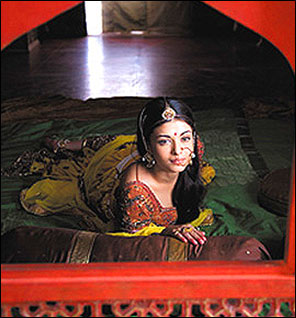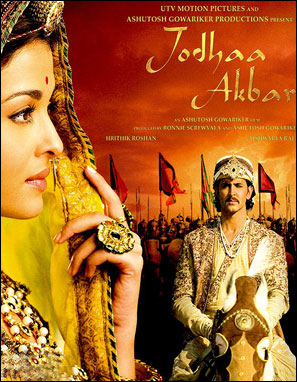|
|
| |
Once
upon a fable
Pop history gets piping hot as Ashutosh Gowarikar's Jodhaa Akbar
stirs up a queen-sized row with India's Rajputs
By Omair
Ahmad
|
| |
Just
as Jodhaa Akbar launched its pre-release publicity campaign last week,
there came a nasty twist in the tale that took Ashutosh Gowariker,
the director of this much-awaited Bollywood extravaganza, completely
by surprise. Amidst all the hype about Aishwarya Rai's lush costumes
and jewellery, and her sizzling on-screen chemistry with co-star Hrithik
Roshan (with whom she shared a famous kiss in Dhoom 2), came allegations
that the historical was, in fact, distorting history. The Rajput Sabha
threatened to stop the film's release and filed a complaint against
Gowariker, questioning whether Akbar ever had a wife called Jodhaa.
While most leading medieval history scholars say there is no evidence
that Akbar's queen was Jodhaa (or Jodhabai), such historical quibbles
hardly explain the strong emotions the film's imminent release has
aroused. Issues of Rajput pride and honour seem to be at the root
of the Sabha's agitation.
|
 |
| |
Popular
perception has long held that Jodhabai was Akbar's Hindu wife--a belief
reinforced by the film Mughal-e-Azam, in which Durga Khote gave a
memorable performance as the emperor's strong-willed Rajput queen.
Tourist guides at Fatehpur Sikri have carried forward the myth, pointing
out an imposing sandstone structure as Jodhabai's Palace where, they
tell us, she even had her puja room and a separate kitchen. But the
boundary between myth and historical fact is often disputed. As Mohammed
Amin, former head of the history department at Delhi's St Stephens'
College, says, "There are facts that we historians can prove
and 'facts' that have entered the popular imagination."
Leading scholars of medieval history, Irfan Habib, Satish Chandra
and Harbans Mukhia, categorically dismiss the idea that Akbar had
a wife named Jodhabai.
But what is indisputable, they say, is that he had a number of Rajput
wives and that they were influential figures at his court. According
to Satish Chandra, former UGC chairman and author of the NCERT textbook,
Medieval India: From the Sultanate to the Mughals, "Akbar had
more than 20 queens and most of his Rajput allies sent him their daughters
in marriage." He adds that
"I can't think of a single film on Hindu Muslim love where the
woman is Hindu." Mukul Kesavan, Film Critic |
| |
The
daughter of the Raja of Amber (now Jaipur) was the first of his Rajput
wives and probably the mother of his heir Salim (later emperor Jehangir).
In recognition of her special status, Akbar gave her the title of
Mariam-uz-Zamani (Holy Mother of the Universe), but there is no record
of her real name or that of any of the other queens.
Mukhia has an explanation for this. While Akbar was a remarkably unbigoted
man in many ways and never asked his Hindu wives to convert, he never
allowed their names to be spoken publicly or recorded. He felt public
knowledge of a woman's name would somehow stain her purity, so he
decreed that his many queens should only be known by conferred titles,
says Mukhia.
But although their names are lost to history, Akbar's Rajput queens
had real power--a fact recorded by court historian Badayuni. They
arranged the marriages of Akbar's son to Rajput princesses and when
the minister of religious affairs executed a Brahmin against Akbar's
orders, they taunted Akbar about his inability to enforce his will.
|
 |
| |
The
Rajput Sabha, however, has its own version of Mughal history. It takes
strong objection to Jodhaa Akbar being projected as a love story,
as well as to the very title of the film. "Jodhabai was the name
of one of Salim's wives, the daughter-in-law of Akbar. It's a serious
distortion of history to say he fell in love with her," says
Narendra Singh Rajawat, the president of the Rajput Sabha. But what
really irks the Sabha is reflected in the complaint of another member
who wishes to remain anonymous: "The Rajput princesses were making
supreme sacrifices for the welfare of their people by accepting such
marriages," she says, "Love had absolutely nothing to do
with it.
"A claim that many Rajasthanis would scoff at--for example, during
the Gujjar-Meena agitation last year, the Meenas circulated a pamphlet
that taunted the Rajputs for simply giving away their daughters to
the Mughals to curry favour, instead of defending their homeland.
The practice of vassal states giving daughters to conquering rulers
has a long tradition in Indian history. As far back as the 4th century
BC, Chandra-gupta Maurya married the daughter of the Macedonian king
he had defeated. Six hundred years later, Samudragupta made it a practice
for his vassal kings to send their daughters to him in marriage. The
Rajputs seem to have done much better under the Mughals, with Akbar
himself joining the baraat when his son married the Amber princess.
In fact, as Amin points out, generations of Mughal rulers were the
sons of Rajput mothers.
Yet another aspect of Jodhaa Akbar that may have provoked the ire
of those who oppose the film is that this is the first major Bollywood
film about a Hindu woman in love with a Muslim man. Observes film
critic and author Mukul Kesavan, in most Hindu-Muslim love stories
on cinema, the woman has always been Muslim. "I can't think of
a single major film that shows the woman being a Hindu," he says.
Four well-known films, Veer-Zaara, Gadar, Bombay and Henna, all had
a Muslim in the woman's role. Even Mughal-e-Azam and Gulzar's film
Lekin, which showed Hindu wives of Muslim men, only had them in supporting
roles. So is Rajput Sabha's petition about historical veracity just
a red herring to distract people from their real source of anger?
In his defence, Gowariker says he chose to use the name Jodhaa Akbar
on the basis of books such as Medieval India by K.N. Khurana, Akbar
by Munilal and Harishankar Sharma's Madhyakaleen Bharat. Gowariker
also consulted Habib. Habib confirms this, but adds dismissively,
"We disagreed on almost everything."
However, to Gowariker's immense relief, the courts have now ruled
that the film only has to add a disclaimer saying it isn't historically
accurate. Gowariker is more than willing to concede. "I have
only 30 per cent of the facts, that a young Mughal emperor married
a Rajput princess. What happened afterwards is what my movie is about
and that is the 70 per cent that I have imagined."
Historians may have issues with accuracy, but to them it is only a
film, a love story, "and nothing to get worked up about,"
as Amin says. Even if it takes a giant leap of imagination to see
toyboy Hrithik Roshan as the emperor Akbar.
Courtesy Outlook India
|
| |
|

